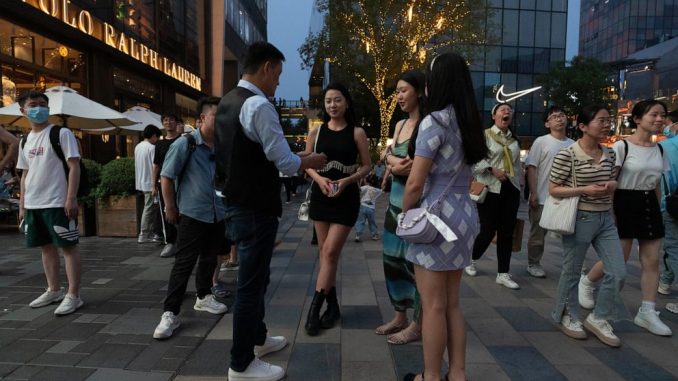
HONG KONG — Chinese shoppers were treated to deep discounts, new products and payment plans as online merchants sought to revive their sluggish appetite for spending during China’s first major online shopping festival after the end of zero-COVID policies.
For the first time, e-commerce retailer JD.com did not release the results of its 618 shopping festival, which ended Sunday, making it hard to know just how much was spent. A bigger shopping festival, Single’s Day, held on Nov. 11 each year rakes in billions of dollars.
Analysts said most consumers have become more price-conscious and reluctant to spend given the sluggish economy.
“Chinese consumer confidence remains weak due to a mix of geopolitics, continued weakness from COVID-19 and domestic Chinese politics,” said Shaun Rein, founder and managing director of the China Market Research Group in Shanghai.
Rein said that overall, consumers likely spent less during 618 as online retailers already were discounting heavily because of the pandemic, so the deals on offer were not much of an improvement.
“For months, Chinese consumers have been price-conscious, looking for deals and trading down across most product categories,” Rein said.
Retail sales — a key indicator of consumption — missed growth forecasts in May, increasing 12.7% from a year earlier and slowing from an 18.4% jump in April, according to the National Bureau of Statistics.
China’s leaders have for years been trying to shift the economy from one driven by construction and other investments to one fueled by the consumer spending that is the lifeblood of the U.S. and other advanced economies.
But with the recovery from disruptions due to the pandemic already faltering, shoppers have yet to resume spending as freely as in the past.
To entice customers and boost spending, e-commerce platforms have been investing billions of yuan in incentives and subsidies for customers and merchants alike.
In March, JD.com launched a “10 billion yuan subsidies” program to compete with rival Pinduoduo, which is known for its low-priced goods. The CEO of Alibaba’s e-commerce business unit, Trudy Dai, also has promised “huge, historic” investments to attract users to its platforms.
Despite soft overall consumption, categories like cosmetics and luxury goods saw bigger gains in sales. Many luxury brands took part in the online festival, according to Jacob Cooke, CEO of e-commerce consultancy WPIC.
“Luxury coming back online is a big trend, because that’s the category that’s been hit really hard over COVID-19,” said Cooke. “Some brands may see up to a 10-fold increase in sales over last year.”
Chinese media reports said those willing to splash out did so, with early results showing strong sales of high-end brands such as Bulgari and Celine. Other upscale brands like Max Mara, Valentino, and Maison Margiela saw a 20-fold increase in sales compared to the year before, according to JD.com data at the beginning of the festival.
Burberry, Chloe and Miu Miu’s sales in the first 30 minutes of the 618 festival, at the end of May, exceeded their total sales during the shopping festival a year earlier, according to Tmall data.
This year, more luxury brands took part as they sought to boost sales in China after their first decline in five years amid China’s strict “zero-COVID” policies and lockdowns that hammered retail spending.
Some brands, like Moncler and Lemaire, participated on Tmall for the first time.
Many also took the opportunity to launch new products online, with some offering rare discounts and other incentives such as interest-free payment in instalments over 12 months. On Tmall, Coach discounted some of its handbags by 75%, and Jimmy Choo also sold its signature Romy heels at 50% off.
Big ticket items like air conditioners and electric vehicles also did well. Midea and Haier, which are known for their household appliances, saw sales exceed 100 million yuan ($13.97 million) in minutes on JD.com when the festival first began.


Be the first to comment